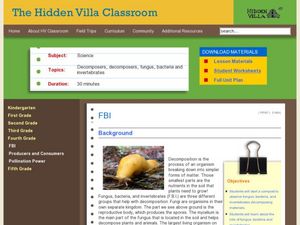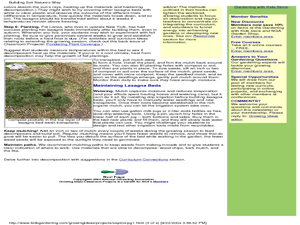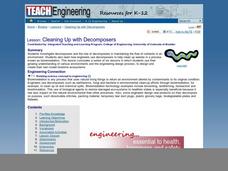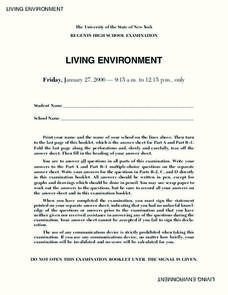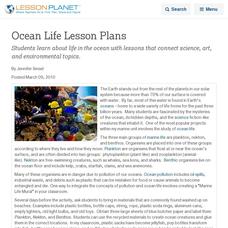Science Geek
Build a Food Web Activity
Entangle your life science class in learning with this collaborative food web activity. Using pictures of the plants and animals native to a particular ecosystem, young biologists work in small groups to construct visual representations...
Exploring Nature Educational Resources
Building A Classroom Food Web
From bears and owls to chipmunks and trees, all life depends on the sun for the energy to survive. Young biologists develop an understanding of this big idea as they arrange this series of plant and animal picture cards into food webs...
Kentucky School for the Deaf
Levels of Organization within an Ecosystem
From tiny organisms to entire biomes, young scientists examine the interdependent relationships tying all living and non-living things together with this collection of ecology resources.
National Wildlife Federation
Habitat Web
Young scientists weave together an understanding of ecosystems with this fun collaborative activity. Taking on the roles of different living and non-living elements of specific habitats, learners use a ball of yarn to create the web of...
National Park Service
Living & Non-Living Interactions
What better way to learn about ecosystems than by getting outside and observing them first hand? Accompanying a field trip to a local park or outdoor space, this series of collaborative activities engages children in learning about the...
Baylor College
They're Everywhere: Bacteria
Totally gross out your class with the eighth lesson in this series on food science. Explore the microscopic world of bacteria by taking swabs of different classroom objects and growing colonies in petri dishes. An engaging activity that...
Curated OER
FBI
Fourth graders experiment with compost. In this Science lesson, 4th graders begin a worm compost as well as an outdoor compost. Students discuss decomposition.
Curated OER
Building Soil Nature's Way: Exploring decomposition and soil health
Students explore decomposition and soil health by creating their own garden. In this agriculture lesson, students build a "lasagna garden" with organic matter found in the area and plant perennials native to their region. Students are...
Curated OER
Interactions of Living Things
Is it a producer, carnivore, omnivore, scavenger, or decomposer? Different relationships among organisms are explored here. It is a simple, multiple choice assignment. Use it as a quick warm-up or quiz.
Curated OER
Biological Relationships
Create a written document to show knowledge of producers, consumers, decomposers, and symbiotic relationships. To investigate food consumption, your classes will differentiate between types of symbiosis and explain examples of each.
Curated OER
it's Lonely At The Top
Students explore the differnences between food producers in food webs and food consumers in food chains. Behavioral choices of primary and secondary consumers such as herbivores, vegetarians, carnivors, and omnivors are analyzed.
Curated OER
Cycling of Matter and Energy
These twenty various types of questions related to the cycling of matter and energy require students to match each definition in column 1 with the correct vocabulary term from column 2. Then, students explain what is being demonstrated...
Curated OER
Sample Midyear Examination (Chemistry and Biology)
A 12-page midterm exam sample can be given to young scientists in preparation for an exam. This particular installment is geared toward a class that delves into both ecology and chemistry concepts. There is no way to separate the 50...
Curated OER
F.B.I.
Learners create a worm bin full of fruit and vegetable scraps wit paper and observe what happens over time. In this decomposers lesson plan, students observe that the fruit and vegetable scraps become new soil.
Curated OER
Composting
Using 2-liter bottles, junior ecologists create composting tubes in which they place nitrogen-rich and carbon-rich materials. They observe what changes occur over two weeks' time. Provide more specific direction to your class as to what...
Curated OER
Cleaning Up With Decomposers
Students read and discuss decomposers and how they affect the environment. In this decomposers lesson plan, students also discuss how engineers use decomposers to help the environment.
Curated OER
Nutritional Relationships Chart
Producers, Herbivores, Carnivores, Decomposers, oh my! Help organize the intricacies between these four types of eaters with this biology activity. Scientists display nutritional relationships in a graphic organizer. They place 15 terms...
Curated OER
Living Environment
In this environment lesson young scholars complete a series of multiple choice and short answer questions on the food chain, DNA, cellular reproduction.
Curated OER
Ocean Life Lesson Plans
Students learn about life in the ocean with lessons that connect science, art, and environmental topics.
Curated OER
Eco-Detectives
Students explore natural decomposers. In this decomposing lesson plan, students participate in a WebQuest to discover how nature handles decomposition. Students compare natural methods for decomposition with recycling efforts.
Curated OER
Ecosystem Game
Students examine the ecosystem by playing a game. In this ecosystem lesson, students are put into groups of decomposers, consumers, and producers. Students create a list of animals that fit into each group and items that represent...
Curated OER
Ecology Study Guide
In this ecology study guide, students fill in a table about producers, consumers and decomposers, they draw the water cycle, they fill in diagrams about cell respiration, the food pyramid, protein synthesis and nitrification, population...
Curated OER
Mini-Ponds
In this mini pond worksheet, learners create a mini-pond ecosystem with soil, water, and plant life. Students let their ecosystem sit for a day and they observe a sample the next day. Learners identify all the pond water microorganisms...
Curated OER
Flow of Energy Through An Ecosystem
In this flow of energy in an ecosystem, students complete a graphic organizer and show the flow of energy from the sun to producers, primary consumers, secondary consumers, tertiary consumers and then decomposers. Students define each of...








